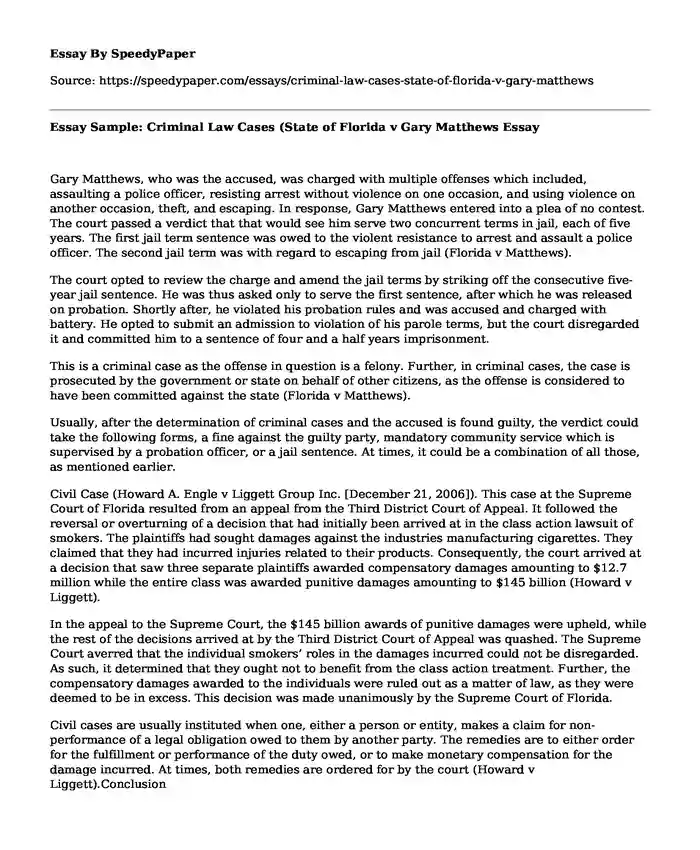
| Type of paper: | Essay |
| Categories: | Criminal law Court system Judicial system Criminal justice Essays by wordcount |
| Pages: | 3 |
| Wordcount: | 638 words |
Gary Matthews, who was the accused, was charged with multiple offenses which included, assaulting a police officer, resisting arrest without violence on one occasion, and using violence on another occasion, theft, and escaping. In response, Gary Matthews entered into a plea of no contest. The court passed a verdict that that would see him serve two concurrent terms in jail, each of five years. The first jail term sentence was owed to the violent resistance to arrest and assault a police officer. The second jail term was with regard to escaping from jail (Florida v Matthews).
The court opted to review the charge and amend the jail terms by striking off the consecutive five-year jail sentence. He was thus asked only to serve the first sentence, after which he was released on probation. Shortly after, he violated his probation rules and was accused and charged with battery. He opted to submit an admission to violation of his parole terms, but the court disregarded it and committed him to a sentence of four and a half years imprisonment.
This is a criminal case as the offense in question is a felony. Further, in criminal cases, the case is prosecuted by the government or state on behalf of other citizens, as the offense is considered to have been committed against the state (Florida v Matthews).
Usually, after the determination of criminal cases and the accused is found guilty, the verdict could take the following forms, a fine against the guilty party, mandatory community service which is supervised by a probation officer, or a jail sentence. At times, it could be a combination of all those, as mentioned earlier.
Civil Case (Howard A. Engle v Liggett Group Inc. [December 21, 2006]). This case at the Supreme Court of Florida resulted from an appeal from the Third District Court of Appeal. It followed the reversal or overturning of a decision that had initially been arrived at in the class action lawsuit of smokers. The plaintiffs had sought damages against the industries manufacturing cigarettes. They claimed that they had incurred injuries related to their products. Consequently, the court arrived at a decision that saw three separate plaintiffs awarded compensatory damages amounting to $12.7 million while the entire class was awarded punitive damages amounting to $145 billion (Howard v Liggett).
In the appeal to the Supreme Court, the $145 billion awards of punitive damages were upheld, while the rest of the decisions arrived at by the Third District Court of Appeal was quashed. The Supreme Court averred that the individual smokers’ roles in the damages incurred could not be disregarded. As such, it determined that they ought not to benefit from the class action treatment. Further, the compensatory damages awarded to the individuals were ruled out as a matter of law, as they were deemed to be in excess. This decision was made unanimously by the Supreme Court of Florida.
Civil cases are usually instituted when one, either a person or entity, makes a claim for non-performance of a legal obligation owed to them by another party. The remedies are to either order for the fulfillment or performance of the duty owed, or to make monetary compensation for the damage incurred. At times, both remedies are ordered for by the court (Howard v Liggett).Conclusion
An important aspect to note when going through the Supreme Court cases is that it not only has jurisdiction over appeal cases from the Court of Appeal but also other types of cases. However, its jurisdiction is strictly limited to appeals surrounding the death penalty sentence, the use of public utilities, and matters involving constitutional interpretation.
Works Cited
State of Florida v. Gary Matthews. (n.d.). Retrieved June 30, 2020, from https://law.justia.com/cases/florida/supreme-court/2004/sc03-1676.html
Howard A. Engle, M.D., Et Al. v. Liggett Group, Inc., Et Al. (n.d.). Retrieved June 30, 2020, from https://law.justia.com/cases/florida/supreme-court/2006/sc03-1856-0.html
Cite this page
Essay Sample: Criminal Law Cases (State of Florida v Gary Matthews. (2023, Sep 19). Retrieved from https://speedypaper.net/essays/criminal-law-cases-state-of-florida-v-gary-matthews
Request Removal
If you are the original author of this essay and no longer wish to have it published on the SpeedyPaper website, please click below to request its removal:
- The Way We Lie - Free Essay in Psychology
- Economic Impacts of Natural Disasters, Free Essay for Students
- Is There Really a Glass Ceiling for Women - Free Essay with Article Review
- Free Essay Example: Psychological Theory and Practice
- Essay Sample on Social Construction and Historical Formation of Gender, Race, and Class
- Paper Example. Environmental Inequality and Justice
- Essay Sample on Slavery, Dueling, and Identity
Popular categories




